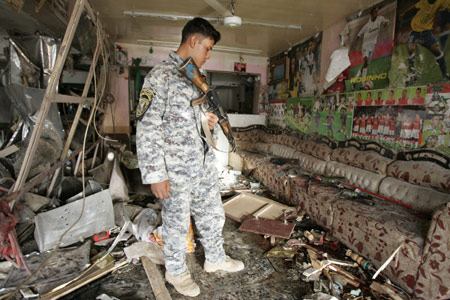A series of bomb attacks since late Sunday have killed at least 20 people and wounded some 91 others, just days before the US troops are to leave Iraqi cities and towns, raising fears that Iraqi security forces is not able to fight relentless insurgency.
A booby-trapped car parked in Baghdad central district of Karrada was detonated, killing five people and wounding 20 others, while three people were killed and 30 wounded when a roadside bomb ripped through a popular marketplace in northeast Baghdad's Shaab district, the police said.
 |
|
An Iraqi policeman inspects the site of a bomb attack in Baghdad June 22, 2009. [Xinhua] |
Another roadside bomb struck a KIA minibus carrying passengers near al-Hamza Square in Baghdad's eastern neighborhood of Sadr City, killing three people and wounding 12 others, the police added.
In west of Baghdad, a suicide car bomber struck a local municipality building and a nearby police station in the town of Abu Ghraib on Monday afternoon, killing seven policemen and wounding 13 people, a local police source said.
The attacker hit a checkpoint outside the local government compound in the mainly Sunni town, some 20 km west of Baghdad, he said.
The blast which destroyed part of the compound buildings, occurred during the presence of US troops, he added.
The source could not provide further details about the incident as the US troops have sealed off the area.
Meanwhile, residents of the town said the US soldiers also sustained some casualties, but the US military has no immediate comment on the attack.
Also on Monday, three people were wounded in a roadside bomb explosion in the neighborhood of al-Habibiyah in eastern Baghdad. Late Sunday, two people were killed and 13 others injured in a bomb explosion inside a coffee shop in Baghdad's southern neighborhood of Abu Dsheer, according to the police.
The latest attacks followed one of the most deadliest bombings in several months when a massive truck bomb explosion killed up to 73 people and wounded more than 180 others, destroying over 50 clay homes in Taza impoverished Shiite slum in the city of Kirkuk, some 250 km north of Baghdad.
Violence in Iraqi cities has dropped dramatically in recent months, but analysts expect that daily attacks will increase ahead of parliamentary election due in January as the Iraqi political parties are expected to struggle for power in the oil-rich country.
The new parliament will form a new government for the next four years.
Iraqi Prime Minister Nuri al-Maliki has warned earlier that militant groups will work hard to stage more attacks to reverse security gains ahead of the withdrawal of US troops from urban Iraqi areas by the end of this month.
"They (militant groups) are preparing themselves to move in the dark to destabilize the situation, but, with God willing, I and you will be ready for them," Maliki said.
The recent rise of deadly attacks cast doubt on the ability of Iraqi security forces to take over from US troops in controlling security and defeating insurgency of both Shiite and Sunni militant groups in the war-torn country.
As part of a security pact signed between Baghdad and Washington last year, US troops will withdraw from Iraq's cities, towns and villages by June 30, 2009 to their bases, and will leave the country on Dec. 31, 2011.
(Xinhua News Agency June 23, 2009)